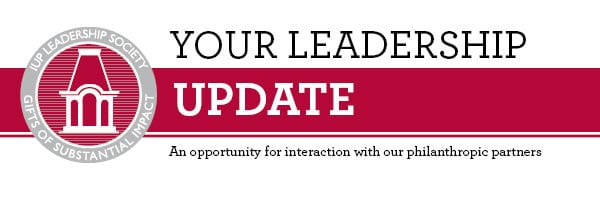I’m not sure why I dug out my college transcript the other day. Perhaps it was nostalgia born of a birthday of minor significance—one that ends in a five. More likely it was creating my example video for IUP’s inaugural Three-Minute Thesis competition, which required that I review the research captured in my doctoral dissertation more than 25 years ago.
(Watch the video, then leave a comment to let me know how I did. Then, please take a moment to see our graduate students’ presentations. Our Three-Minute Thesis program is part of a worldwide competition, and we are excited about the opportunities it presents to the IUP community.)
Whatever the reason, as I looked at the course titles I was pleased with how they evoked faces and memories of faculty members and fellow students who were important to my learning and growth as a scholar and as a person. I smiled as I traced the obvious connections between my mathematics, science, computing, and engineering courses and my research, my dissertation, and the first phases of my career.
I was more impressed as I scanned the list of my general education courses—the courses in the humanities, social sciences, and the arts that I was “forced” to take to graduate. Viewed through the lens of decades of life experience, I see how these courses, chosen out of idle curiosity or scheduling necessity from a list of requirements, served me well as I navigated the world.
Our job today is to carefully craft an experience—in the classroom and in the world—that will serve our students well in a future we will not know.
A series of courses on the Old and New Testaments gave me a deep intellectual understanding of the basis of my personal faith, an understanding that served me well as I learned to be a transformative servant leader in the crucible of a challenged church in Oregon. And my struggles in a course on Hinduism (I barely managed to get a C+) helped me to understand the many ways people approach the spiritual side of life, an understanding that developed into strong empathy for all approaches—something that serves me well as the leader of an incredibly diverse university.
Introductory political science courses showed me that there were as many philosophical frameworks for human society as there have been great political philosophers. A following course in international relations posited the professor’s theory that war is the natural condition of nations, a theory strongly supported by history and as strongly rejected by me as I have since had the chance to work with people from around the world. I think that my conviction that we must build bridges between people from different lands is of immense value as IUP prepares today’s students to be global citizens and as we welcome nearly a thousand international students to Indiana, Pennsylvania, every year.
And the music appreciation and performance courses gave me enhanced knowledge and love of this art, enriching my life and my 30-plus years of marriage to a woman who studied opera performance.
The most important lesson of my walk down memory lane was to recognize that as a college student, I had no understanding that what I learned in these courses would so enable my success in my life and my career.
Our job today is to carefully craft an experience—in the classroom and in the world—that will serve our students well in a future we will not know. And just maybe we can help them to get an early glimpse of how that student experience will enrich their lives many years hence.
